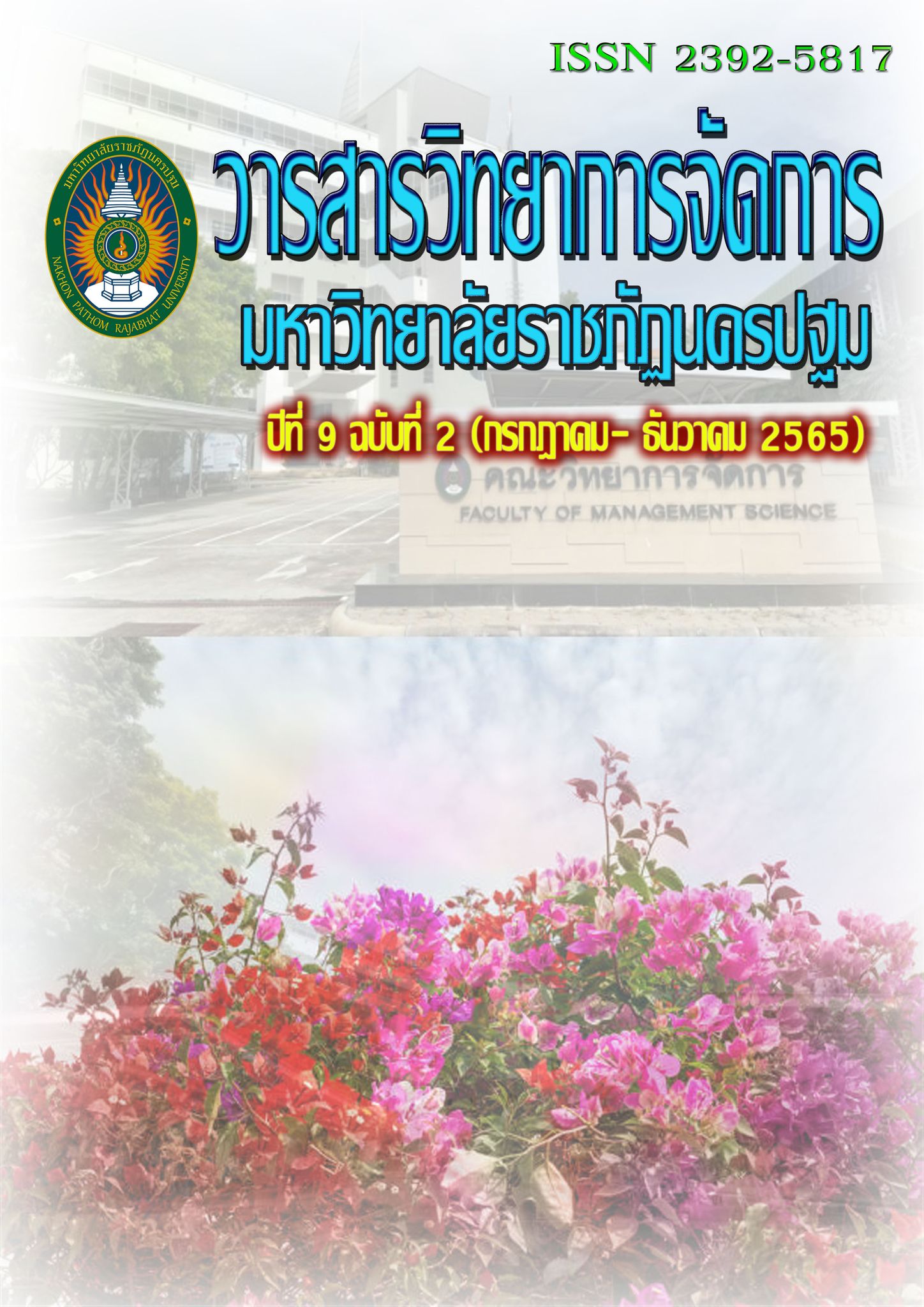The Structural of Customer Relationship Management of Electrical Appliance Business in Bangkok and Perimeter
Main Article Content
Abstract
The objectives of this research were: (1) the factors influencing the operation of the electrical appliance business in the Bangkok Metropolitan Region. (2) the relationship of causal factors influencing the operation of the electrical appliance business in the Bangkok Metropolitan Region. and (3) the develop relationship model of causal factors affecting the electrical appliance business operation in the Bangkok Metropolitan Region. This research was a mixed methodology as quantitative research and qualitative that the researcher to determine the population for this study by executives of the electrical appliance business in Bangkok Metropolitan Region, 400 people. The researcher used multi-stage Sampling method. The researcher analyzed the data by using the structural equation model analysis the structural equation modeling: SEM
Major Findings: (1) Service quality, communication, conflict management it has a positive direct influence on the quality of the relationship. The performance electrical appliance business positive service quality, communication, conflict management which is consistent Index of the relationship of causal factors affecting the electrical appliance business operation in the Bangkok Metropolitan Region. The model is consistent with empirical data, six indexes that pass the acceptance criteria is the index 2 /df = 1.205, CFI = 1.000, GFI = 0.970, AGFI = 0.960, RMSEA = 0.019 and SRMR = 0.021 The structural equation model is appropriate and harmonious with the data changes model 2 = 304.82, df- 160, P-value = 0.000, CFI = 0.990, GFI = 0.950, AGFI = 0.930, RMSEA = 0.040 and SRMR= 0.029. (2) In order for the electrical appliance business operators to have a better relationship entrepreneurs must take the service quality factor that consists of 6 parts: customer response assuring customers efficiency privacy and Compliance is used in business administration further.
Article history: Received 19 December 2021
Revised 27 February 2022
Accepted 1 March 2022
SIMILARITY INDEX = 7.02 %
Article Details

This work is licensed under a Creative Commons Attribution-NonCommercial-NoDerivatives 4.0 International License.
The views and opinions of the article appearing in this journal are those of the author. It is not considered a view and responsibility of the editorial staff.
References
Caceres, R.C. and Paparoidamis. N.G. (2007). Service quality, relationship satisfaction, trust, commitment and business-to-business loyalty. European of Marketing, 41(7/8) 836-867.
Carr, A.S. and Kaynak, H. (2007). Communication methods, information sharing, supplier development and performance: An empirical study of their relationships. International Journal of Operations and Production Management, 27 (4) 346-370.
Duncan, T. and Moriarty. (1999). Commentary on relationship-based marketing Duncan, communications. Australasian Marketing Journal, 7(1) 118 -20.
Fynes, E. de Bu S. and Marshall, D. (2004). Environmental uncertainty, supply chain relationship quality and performance. Journal of Purchasing and Supply Management, 10. 179-90.
Giovanis, A., Athanasopoulou, P. and Tsoukatos, E. (2015), The role of service fairness in the service quality – relationship quality – customer loyalty chain: An empirical study, Journal of Service Theory and Practice, 25 (6) 744-776. https://doi.org/10.1108/JSTP-11-2013-0263
Gronroos, C. (1984). A Service Quality Model Its Marketing Implications. European Journal of Marketing, 18(4).36-44.
Jessica J. H, David A. G, and Ryan C. W. (2015). Reciprocity in Relationship Marketing: A Cross-Cultural Examination of the Effects of Equivalence and Immediacy on Relationship Quality and Satisfaction with Performance. Journal of International Marketing, 23 (4). 64-83.
Kevin D. Bradford and Barton A. Weitz. (2009). Salespersons' management of conflict in buyer-seller relationships. Journal of Personal Selling and Sales Management, .24(1) 25-42.
Leonidas, C. Leonidou, S. S, Bilge A., and Michael A. T. (2014). Antecedents and Outcomes of Exporter-Importer Relationship Quality: Synthesis, Meta-Analysis, and Directions for Further Research. Journal of International Marketing, 22, (2). 21-46.
Moreira, A.C. and Silva, P.M. (2015). The trust-commitment challenge in service quality-loyalty relationships. International Journal of Health Care Quality Assurance, 28(3). 253-266.
Naoui, F.B and Zaiem,I. (2010). The impact of relationship quality on client's loyalty: An application in the Para pharmaceutical industry. International Journal of Pharmaceutical and Healthcare Marketing, 4 (2) 137-156.
Negi, R. and Ketema.E. (2013). Customer-perceived relationship quality and satisfaction A case of Ethiopian Telecommunication Corporation. African Journal of Economic and Management Studies, 4(1).109-121.
Ozen, H. (2015). Online Relationship Quality: Does It Increase Repurchase Intention from Private Shopping Sites? International Journal of Academic Research in Business and Social Sciences, 5 (7). 300-312.
Parasuraman, A., Zeithaml, V. A., & Berry, L. L. (1985). A conceptual model of service quality and its implications for future research. Journal of marketing, 49(4), 41-50.
Schultz, W., Apicella, P., Scarnati, E., & Ljungberg, T. (1992). Neuronal activity in monkey ventral striatum related to the expectation of reward. Journal of neuroscience, 12(12), 4595-4610.
Sharma, N. and Patterson, P.G. (1999), The impact of communication effectiveness and service quality on relationship commitment in consumer, professional services. Journal of Services Marketing, .13 (2). 151-170. https://doi.org/10.1108/08876049910266059
Thomas, K.W. (1992). Conflict and negotiation processes in organizations. In Handbook of industrial and organizational psychology, Marvin D. Dunnette, ed. (2nd ed.), Vol. 3. Palo Alto, CA: Consulting Psychologists Press, 651-717.


